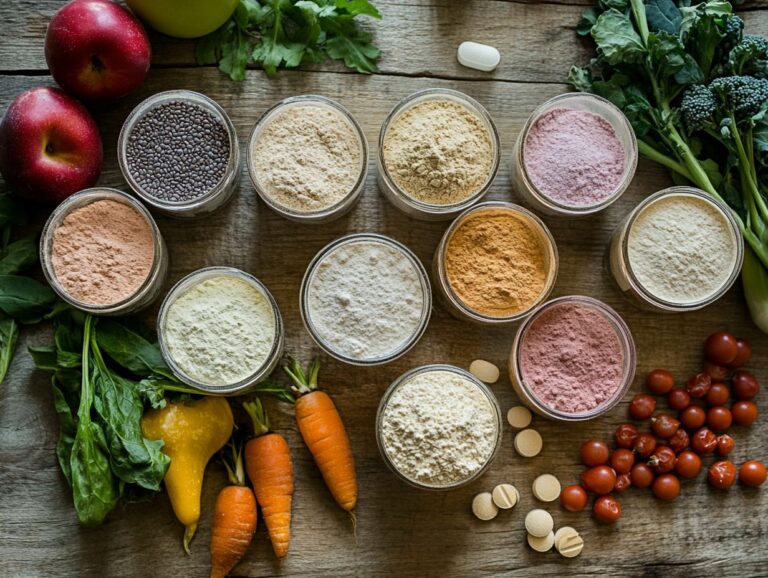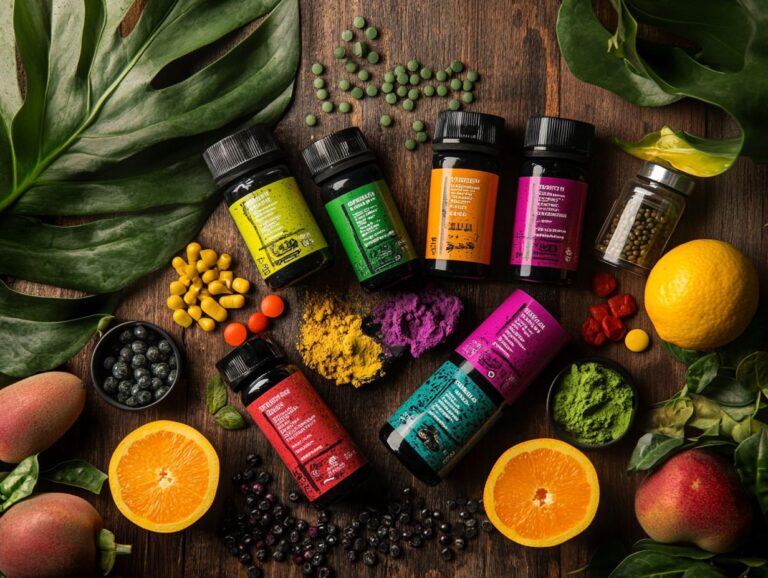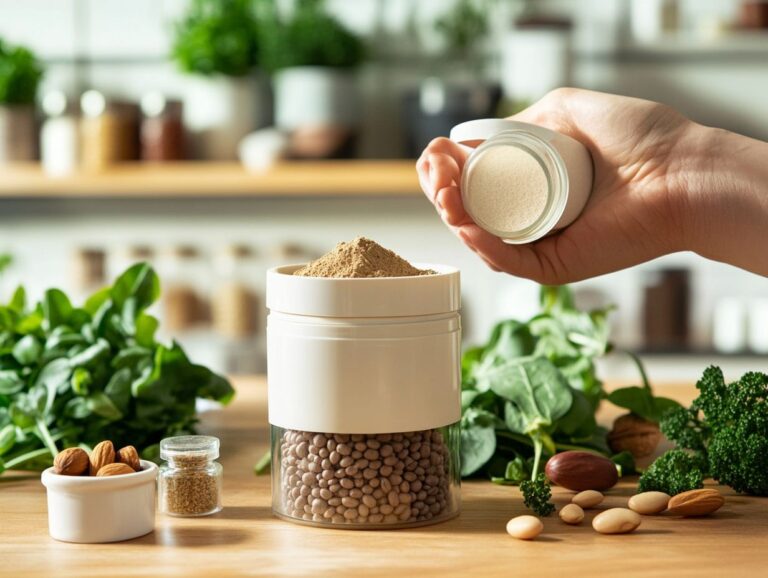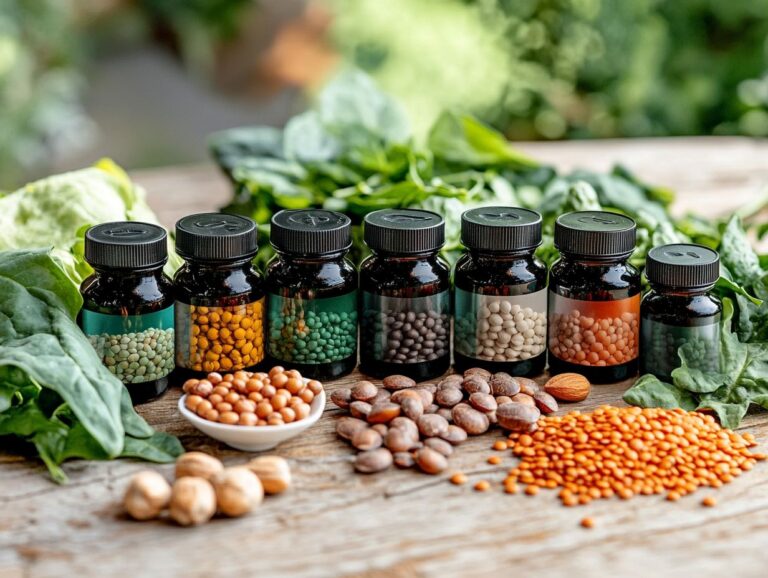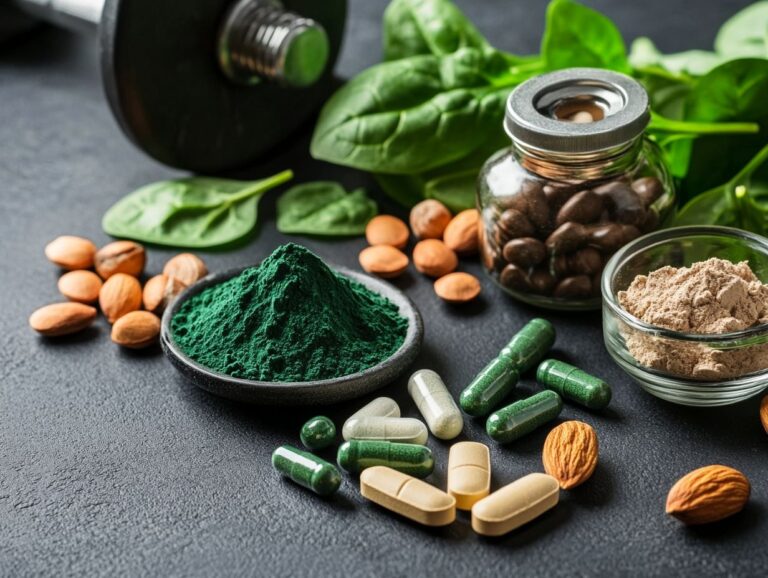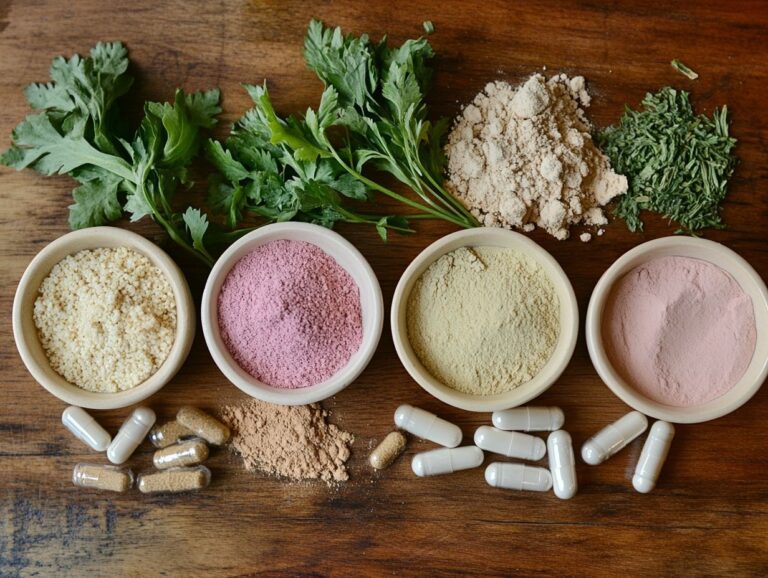Building muscle on a vegan diet presents unique challenges, particularly in obtaining the essential nutrients necessary for muscle growth and recovery, given its healthy lifestyle emphasis. Although a plant-based lifestyle offers numerous health benefits, athletes and other active individuals may struggle to meet their protein, iron, and vitamin requirements, impacting their physical health and athletic performance. This article highlights the importance of vegan supplements for muscle building on a vegan diet, identifies the essential nutrients that are difficult to obtain, and presents effective supplement options. Additionally, you will learn about the criteria for selecting the right products and understanding potential side effects as you embark on your fitness journey.
Key Takeaways:
- Protein, creatine, BCAA, iron, and vitamin D supplements are essential for vegan muscle-building as they provide key nutrients that are difficult to obtain from a plant-based diet.
- When choosing vegan muscle-building supplements, it is important to check the ingredients, consider your fitness goals, and consult with a nutritionist or doctor.
- Potential side effects of vegan muscle-building supplements include digestive issues, allergic reactions, and interactions with medications. It is important to monitor your body’s response and seek medical advice if needed.
Why Are Supplements Important for Vegan Muscle-Building?
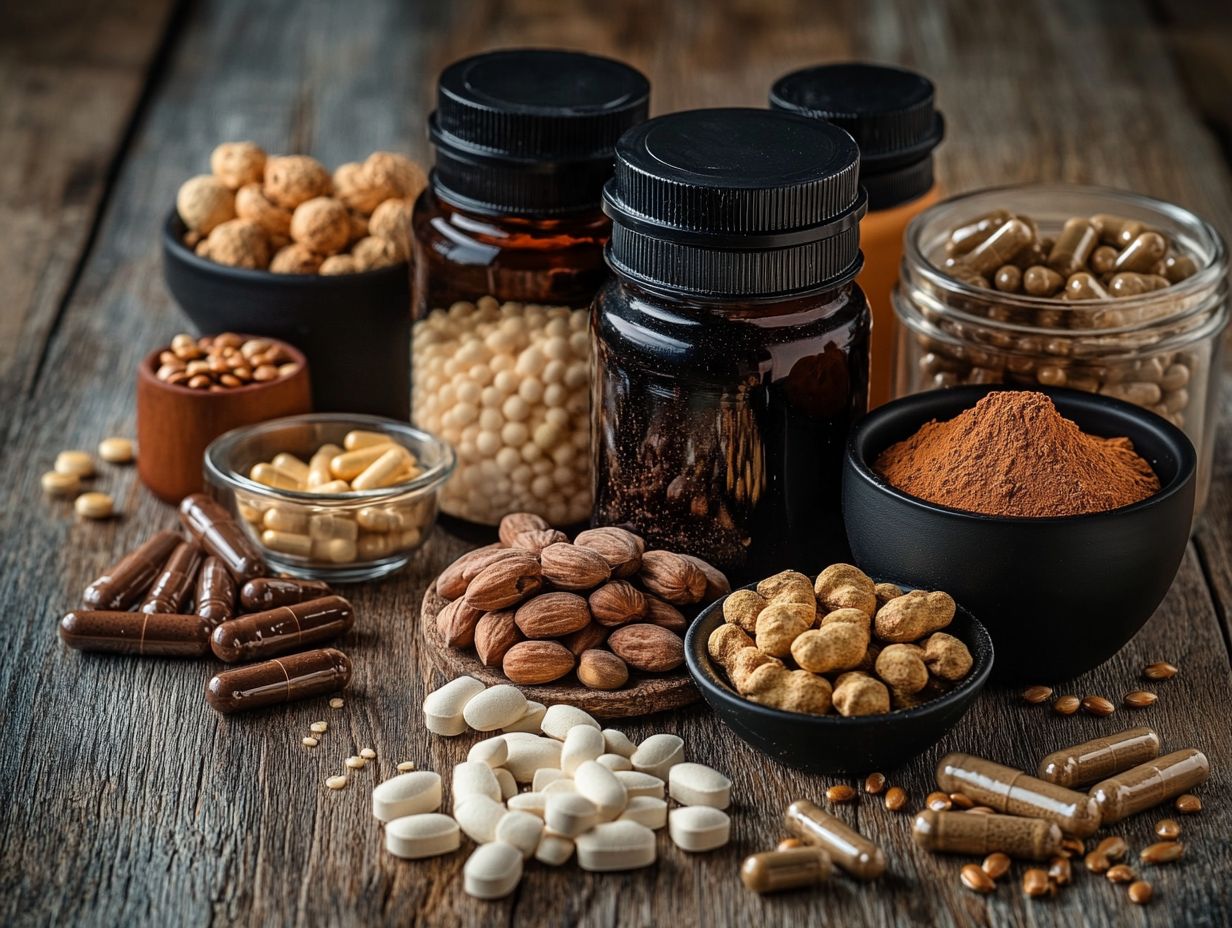 Supplements play a crucial role in the muscle-building process for vegan athletes, as they help to bridge the nutrient gaps often present in a vegan diet. Unlike conventional diets that offer easier access to protein-rich foods, a vegan diet can lead to potential nutrient deficiencies, impacting muscle growth, recovery, and testosterone production. To enhance exercise performance and support muscle recovery, vegan bodybuilders often rely on dietary supplements that provide essential amino acids, vegan protein powder, and other crucial nutrients necessary for effective strength training and proper muscle tissue repair.
Supplements play a crucial role in the muscle-building process for vegan athletes, as they help to bridge the nutrient gaps often present in a vegan diet. Unlike conventional diets that offer easier access to protein-rich foods, a vegan diet can lead to potential nutrient deficiencies, impacting muscle growth, recovery, and testosterone production. To enhance exercise performance and support muscle recovery, vegan bodybuilders often rely on dietary supplements that provide essential amino acids, vegan protein powder, and other crucial nutrients necessary for effective strength training and proper muscle tissue repair.
What Nutrients are Difficult to Obtain on a Vegan Diet?
While a vegan diet is rich in many nutrients, certain vitamins and minerals can be challenging for vegan athletes and vegetarian athletes to obtain, leading to potential nutritional deficiencies. Key nutrients of concern include:
- vitamin B12, which is essential for energy production and metabolism;
- iron, which impacts endurance and energy metabolism;
- omega-3 fatty acids, which are important for overall health, reducing inflammation, and promoting antioxidant actions.
Additionally, supplements like creatine supplementation and taurine may be necessary for those engaged in intensive strength training, as these nutrients are not commonly found in plant-based foods. Research indicates that approximately 36% of vegan athletes have insufficient levels of vitamin B12, which can significantly reduce overall energy and recovery times. Similarly, 27% of vegan athletes experience iron deficiency, which can diminish stamina during prolonged physical activity. To address these concerns, vegan athletes can incorporate fortified foods and specific vegan-friendly sources into their diets. Omega-3 fatty acid supplements derived from algae are particularly beneficial, as they provide the anti-inflammatory support needed for rigorous training regimens. Collaborating with a nutritionist can help vegan athletes develop a balanced diet that emphasizes nutrient-rich foods, enabling them to meet their dietary goals while achieving their athletic performance objectives through proper nutrition.
Types of Vegan Muscle-Building Supplements
The following vegan supplements are available for vegan athletes looking to maximize their training and muscle-building goals while meeting specific nutritional needs.
- Protein: Protein supplements, particularly vegan protein powder, are fundamental for muscle building and addressing nutrient gaps. They are essential for athletes who may not meet their daily protein requirements through diet alone.
- Creatine: Creatine supplementation is a common practice among athletes. For vegan athletes, it can aid in energy production and enhance performance during resistance-type exercises.
- BCAAs: Branched-chain amino acid (BCAA) supplements are popular among bodybuilders and strength athletes. BCAA supplementation is beneficial for muscle recovery and may help reduce muscle soreness following intense workouts.
- Iron: Iron supplementation is crucial for athletes whose diets are low in iron, especially for vegan athletes who are at a higher risk of iron deficiency.
- Vitamin D: Vitamin D supplementation is important for athletes with diets low in vitamin D. This supplement is particularly beneficial for vegan athletes who may be at risk of vitamin D deficiency.
1. Protein Supplements
Protein supplements, particularly vegan protein powders, are essential for athletes looking to increase muscle mass, aid in muscle recovery, and support cell regeneration. Vegan protein powders are available in various forms, including pea protein, hemp protein, and brown rice protein. When selected carefully, these powders can provide a complete amino acid (AA) profile. Essential amino acids are crucial for muscle protein synthesis (MPS), and using protein powder after exercise can significantly reduce recovery time and support muscle hypertrophy (growth). Additionally, vegan protein powders can serve as a source of complete proteins. Athletes often find that blends combining different vegan protein sources yield the best results. When choosing the right protein powder for optimal athletic performance, it’s important to consider the digestibility of the individual proteins, as well as the taste and texture. The impact of added ingredients, such as certain types of fiber, on amino acid absorption and bioavailability is also crucial. Vegan athletes can easily incorporate these supplements into their diets by adding them to smoothies, oatmeal, baked goods, or other meals, thereby increasing protein consumption with minimal effort. This practice helps ensure that protein intake is distributed throughout the day, reducing the risk of protein deficiency by gradually incorporating the powders into various meals. Depending on their specific athletic goals, athletes may opt for a protein powder specifically designed for post-workout recovery or one that promotes muscle mass building.
2. Creatine Supplements
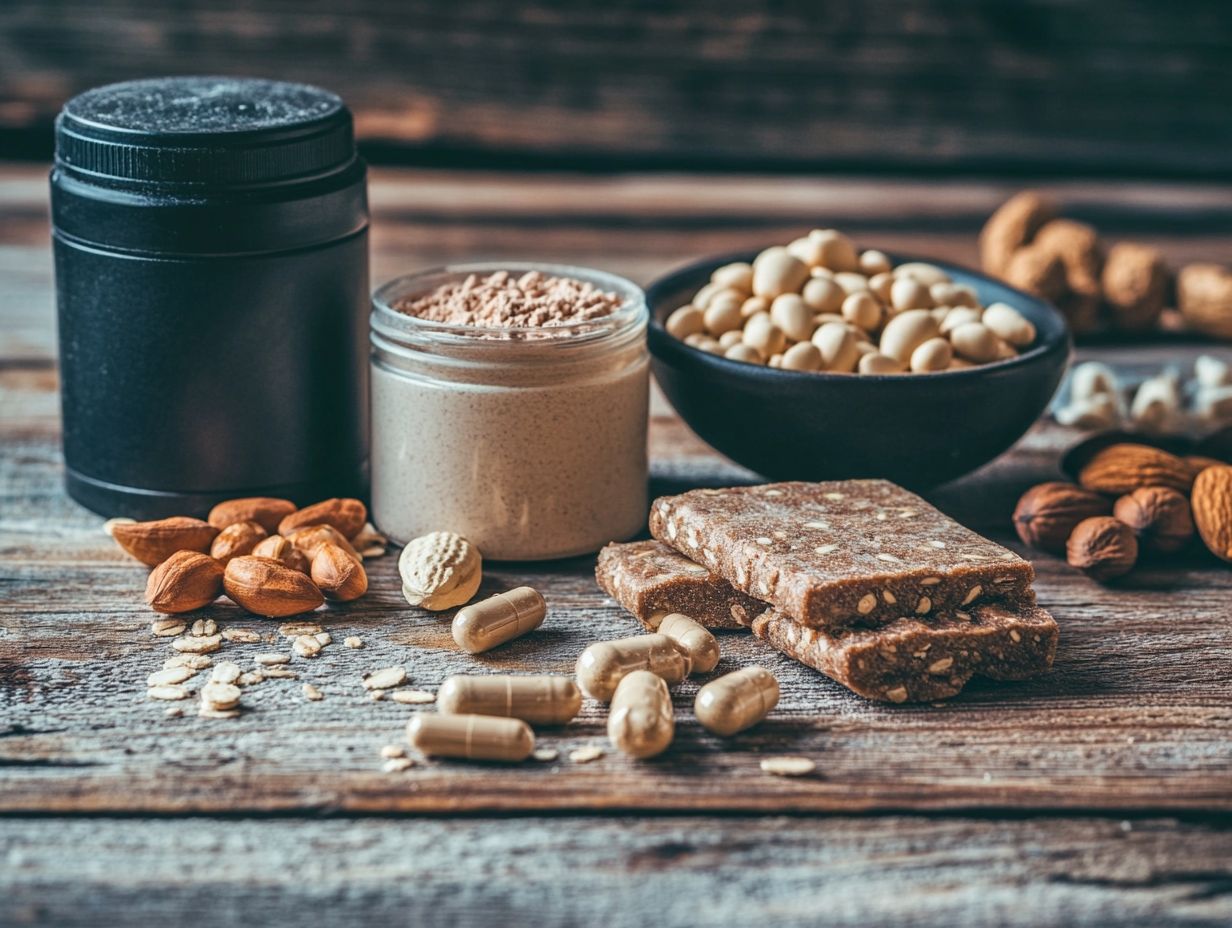 Creatine supplementation is often overlooked in a vegan diet, yet it is a crucial supplement for muscle growth and energy production during high-intensity resistance training. By increasing the availability of ATP (adenosine triphosphate), creatine enhances exercise performance, enabling individuals to push through muscle fatigue and achieve greater gains. When combined with beta-alanine, which reduces muscle soreness and fatigue to improve recovery time, creatine becomes an integral part of an effective supplementation strategy for those engaged in rigorous bodybuilding. Research indicates that creatine contributes to muscle hypertrophy and facilitates faster recovery between workouts, making it an essential addition for athletes who may lack certain nutrients typically found in animal products. Studies have shown that vegans, due to lower levels of natural creatine in their diets, can benefit significantly from supplementation, with improvements in strength of up to 20% in some cases. The most common dosage recommendations range from 3 to 5 grams per day, a relatively low amount that, when combined with a loading phase, can lead to significant performance enhancements. While beta-alanine also boosts endurance, creatine primarily focuses on maximizing explosive power, thus offering a balanced approach to both performance enhancement and recovery.
Creatine supplementation is often overlooked in a vegan diet, yet it is a crucial supplement for muscle growth and energy production during high-intensity resistance training. By increasing the availability of ATP (adenosine triphosphate), creatine enhances exercise performance, enabling individuals to push through muscle fatigue and achieve greater gains. When combined with beta-alanine, which reduces muscle soreness and fatigue to improve recovery time, creatine becomes an integral part of an effective supplementation strategy for those engaged in rigorous bodybuilding. Research indicates that creatine contributes to muscle hypertrophy and facilitates faster recovery between workouts, making it an essential addition for athletes who may lack certain nutrients typically found in animal products. Studies have shown that vegans, due to lower levels of natural creatine in their diets, can benefit significantly from supplementation, with improvements in strength of up to 20% in some cases. The most common dosage recommendations range from 3 to 5 grams per day, a relatively low amount that, when combined with a loading phase, can lead to significant performance enhancements. While beta-alanine also boosts endurance, creatine primarily focuses on maximizing explosive power, thus offering a balanced approach to both performance enhancement and recovery.
3. BCAA Supplements
BCAA supplements, or Branched-Chain Amino Acids, are among the most popular choices for vegan athletes seeking to enhance muscle recovery and exercise performance. These essential amino acids play a crucial role in muscle protein synthesis, helping to reduce muscle soreness and promoting tissue repair following exercise stress. This makes them particularly important for individuals engaged in resistance training or bodybuilding. Additionally, BCAA supplements can enhance endurance, enabling athletes to train harder and for longer periods. For vegan athletes, who may find it challenging to obtain sufficient protein through diet alone, BCAAs serve as a valuable addition to their pre- and post-workout routines. They can be easily mixed with water or added to smoothies and shakes. As a general guideline, vegan athletes should consider taking approximately 5-10 grams of BCAA supplements, which include glucogenic amino acids, before and after workouts, depending on the intensity of their training. BCAAs are believed to help reduce exercise fatigue, providing essential resources that enable athletes to maximize their performance within the context of a plant-based diet.
4. Iron Supplements
Iron supplements are crucial for vegan athletes, as they are more likely to experience iron deficiency due to the absence of heme iron from animal products in their diets. Iron plays a vital role in energy production and aerobic endurance during exercise because it is an essential component of hemoglobin, which transports oxygen, as well as other compounds involved in cellular energy metabolism. A healthy diet that includes iron supplementation is necessary for enhancing fitness and athletic performance in vegan athletes, supporting their recovery period and endurance training. Athletes in general have increased iron requirements due to the physical demands of their training, making them more susceptible to fatigue and diminished performance. Vegans face an even greater risk since non-heme iron (the type found in plant-based foods) is not absorbed by the body as efficiently as heme iron. Supplementation helps these athletes replenish their depleted iron stores. Vegan athletes should consider chelated iron supplements, such as iron bisglycinate, which are gentler on the stomach and offer better absorption. These supplements can be taken with foods high in vitamin C to further enhance their bioavailability.
5. Vitamin D3 Supplements and Their Role in Muscle Growth
Vitamin D3 supplements are essential for vegan athletes, particularly for those who may not receive adequate sun exposure or consume enough fortified foods. This vitamin plays a crucial role in calcium absorption and bone health, both of which are vital for any physical activity, including strength training and bodybuilding. Proper vitamin D levels also support testosterone production, which is important for muscle growth and recovery. Vitamin D levels significantly influence muscle function and overall exercise performance, making these supplements important for maintaining a healthy lifestyle. For vegan athletes, maintaining proper vitamin D levels may be even more critical, as they often lack access to animal sources that provide this nutrient in significant amounts. Research indicates that a daily dosage of 600 to 800 IU is generally sufficient for most individuals; however, it is advisable for people to consult a physician to determine their ideal levels. The two most common forms of vitamin D supplements are D2 (ergocalciferol) and D3 (cholecalciferol), with the latter typically recommended due to its greater effectiveness in raising serum levels. Adequate levels of this essential vitamin support the immune system, help combat inflammation and infections, and are crucial for both physical and mental health among athletes.
How to Choose the Right Vegan Muscle-Building Supplements
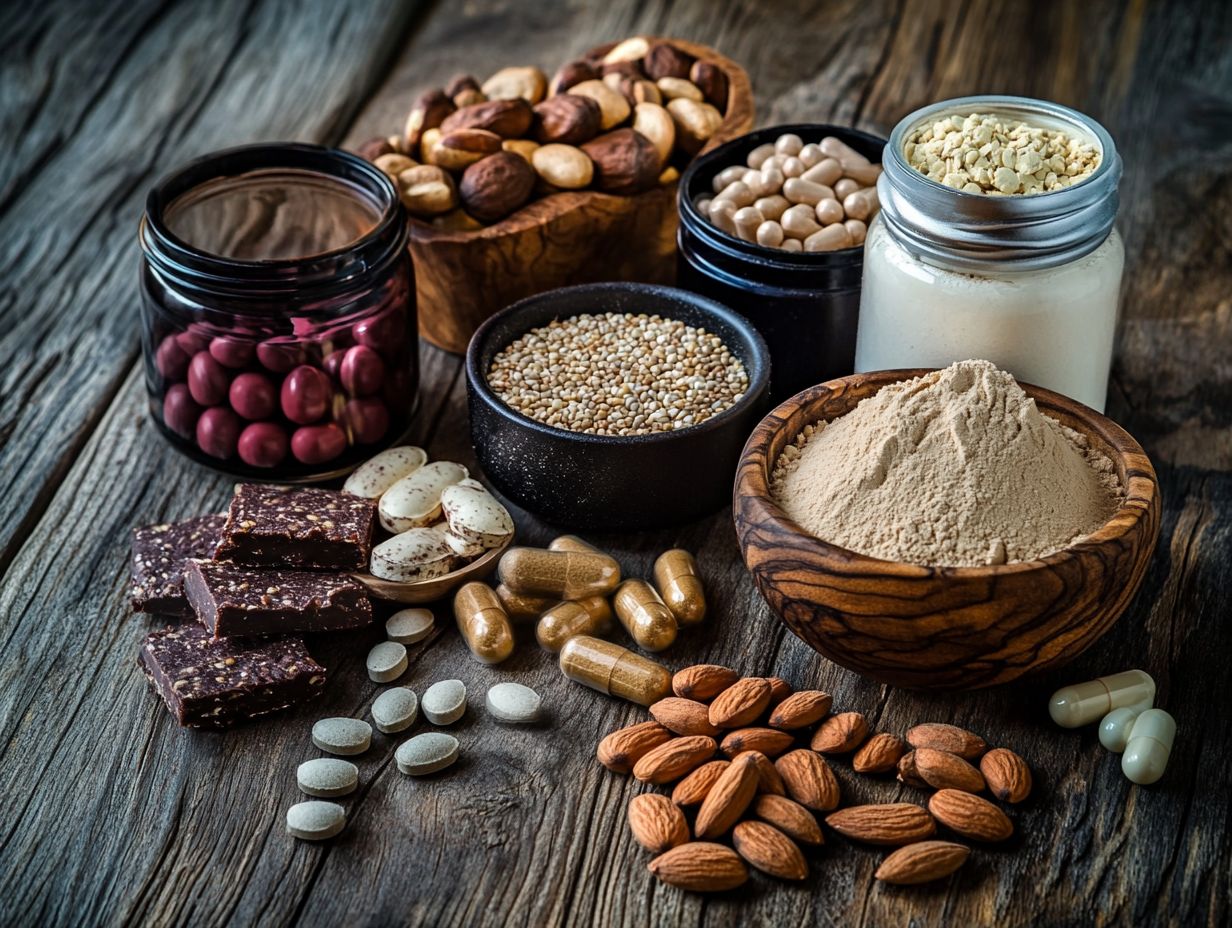 Choosing vegan muscle-building supplements should be based on an individual’s unique exercise goals, dietary requirements, and potential nutrient deficiencies, including those related to essential amino acids, iron deficiency, and vitamin B12. Vegan athletes need to ensure that the supplements they select for muscle growth and recovery align with their specific nutritional needs, including addressing nutrient gaps, thereby adequately supporting their exercise and overall health. Given the wide array of dietary supplements available on the market, it is essential to understand the ingredients and nutritional value to maximize performance in vegan bodybuilding and strength training.
Choosing vegan muscle-building supplements should be based on an individual’s unique exercise goals, dietary requirements, and potential nutrient deficiencies, including those related to essential amino acids, iron deficiency, and vitamin B12. Vegan athletes need to ensure that the supplements they select for muscle growth and recovery align with their specific nutritional needs, including addressing nutrient gaps, thereby adequately supporting their exercise and overall health. Given the wide array of dietary supplements available on the market, it is essential to understand the ingredients and nutritional value to maximize performance in vegan bodybuilding and strength training.
1. Check the Ingredients
When selecting vegan muscle-building supplements, it is crucial to carefully evaluate the ingredients to ensure they are both vegan and of high quality. The ingredients should be free from animal-derived substances, and the nutrient profiles must be optimized to support muscle growth and recovery. It is important to include plant-based protein sources, essential amino acids, and additives that enhance absorption and efficacy. Consumers should prioritize whole food ingredients such as brown rice protein or pea protein to achieve a balanced amino acid profile, essential for muscle tissue repair and muscle hypertrophy. The presence of third-party testing certifications is a positive indicator, reflecting a supplement company’s commitment to quality and safety. Conversely, vague ingredient lists and terms like “proprietary blend” should raise red flags, as they often suggest the presence of low-quality fillers or undisclosed ingredients, which can hinder exercise performance and metabolic rate. Additionally, products high in sugars or artificial additives should be avoided, as they detract from the overall health benefits of the supplement. Careful scrutiny during this selection process can lead to improved health outcomes and ensures that ethical dietary choices are being upheld.
2. Consider Your Fitness Goals
Identifying your fitness goals is a crucial step in determining the best vegan muscle-building supplements for your needs. Different supplements are formulated to support various objectives, such as performance enhancement, muscle growth, or recovery. Using a supplement incorrectly can result in minimal results or even potential harm. Therefore, it is essential to understand how the benefits of vegan muscle-building supplements align with your specific goals. For muscle hypertrophy, if your aim is to increase muscle size, consider vegan protein powders like pea protein or brown rice protein, as they provide the essential amino acids necessary for muscle repair and growth. If enhancing exercise performance is your primary goal, look for vegan muscle-building supplements that contain omega-3 fatty acids, L-carnitine, creatine, and beta-alanine. These can improve muscle fatigue resistance and energy production during endurance training. For recovery purposes, branched-chain amino acids (BCAAs) and L-glutamine are popular choices among vegan muscle-building supplements. BCAAs have been shown to reduce muscle soreness and improve recovery times after exercise, while L-glutamine aids in cell regeneration and muscle soreness alleviation following intense workouts. By setting clear fitness goals as part of a comprehensive training program, you can choose the right vegan muscle-building supplements tailored to your needs.
3. Consult with a Nutritionist or Doctor
Engaging with a nutritionist or doctor is an essential step in the journey to finding vegan muscle-building supplements, as they help ensure that personal choices are both healthy and safe and address any nutritional deficiencies or supplementation recommendations specific to a vegan diet. A healthcare professional can conduct a comprehensive analysis of an individual’s dietary patterns, energy metabolism, and health status, aiding in the identification of deficiencies and recommending supplement options that align with the individual’s lifestyle. When searching for a nutritionist or healthcare provider, it is crucial to find one with expertise in vegan nutrition, as these specialists will be well-versed in plant-based diets and their specific requirements. Checking credentials and seeking personal recommendations and testimonials can be very helpful in this process.
Potential Side Effects of Vegan Muscle-Building Supplements
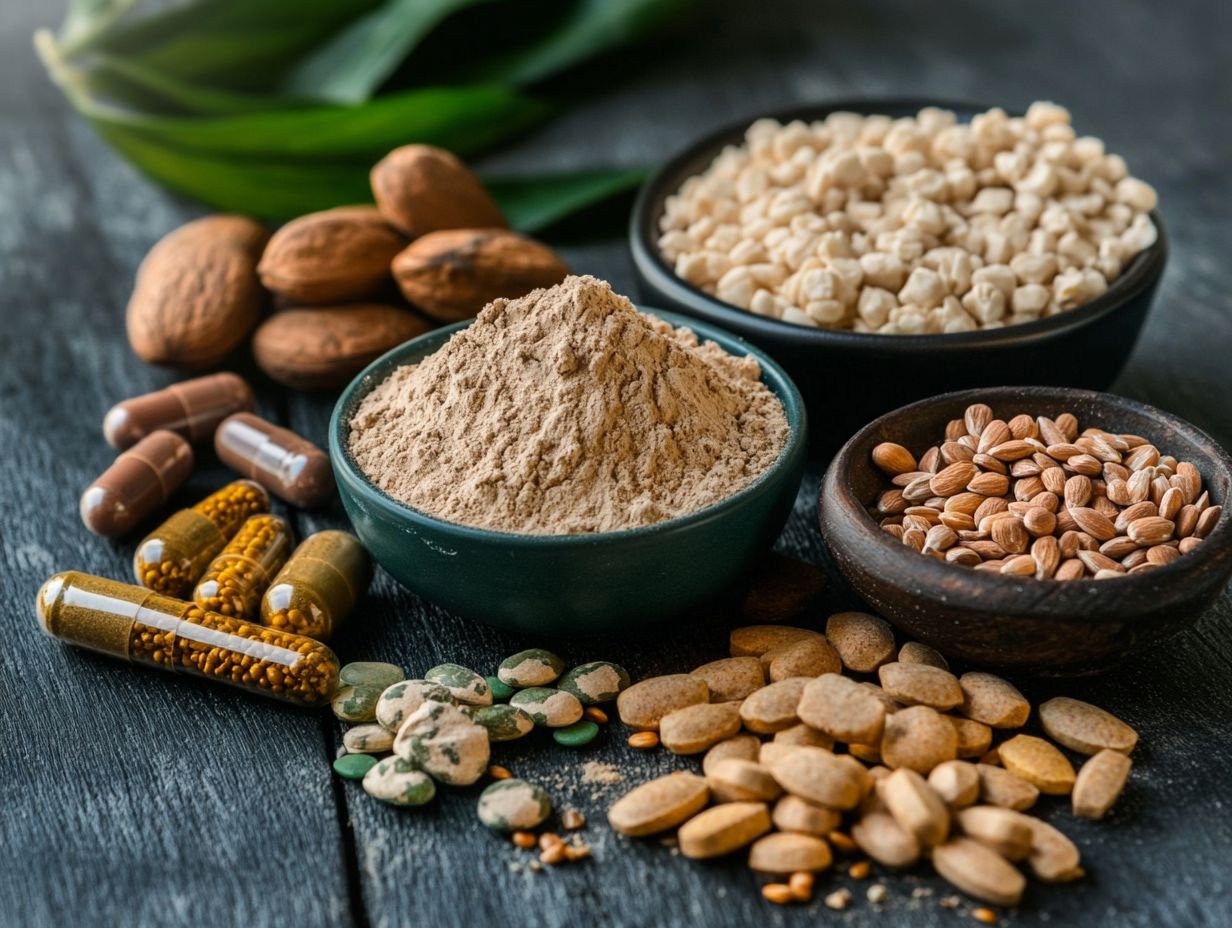 While the benefits of vegan muscle-building supplements may outweigh their drawbacks, it is important to remain mindful of potential side effects. Some users have reported experiencing digestive issues, such as bloating and discomfort, when using vegan protein powders and certain amino acid supplements. Allergic reactions may also occur due to specific ingredients, such as those found in plant-based protein or protein powder blends. Additionally, some supplements could interact with medications, so it is advisable to consult a medical professional for guidance.
While the benefits of vegan muscle-building supplements may outweigh their drawbacks, it is important to remain mindful of potential side effects. Some users have reported experiencing digestive issues, such as bloating and discomfort, when using vegan protein powders and certain amino acid supplements. Allergic reactions may also occur due to specific ingredients, such as those found in plant-based protein or protein powder blends. Additionally, some supplements could interact with medications, so it is advisable to consult a medical professional for guidance.
1. Digestive Issues
Digestive issues are a common side effect of many vegan muscle-building supplements, particularly protein powders and amino acid supplements. Vegan protein powders can lead to bloating, gas, and other digestive discomforts, especially if they contain ingredients that are harder to digest, such as pea or soy protein. To alleviate these problems, it is important to choose high-quality vegan protein powders and be cautious when introducing them into the diet. Additionally, individuals can consider opting for rice or hemp protein sources, which are generally easier to digest and support healthy nutrition. Digestive enzymes may also help relieve discomfort, as they assist in breaking down proteins more thoroughly. Maintaining proper hydration and monitoring food intake are essential for digestive health. It is advisable to start with smaller amounts of supplements to assess how the body responds before increasing the dosage. Consulting with a healthcare professional can provide personalized recommendations based on specific sensitivities.
2. Allergic Reactions
Allergic reactions can occur with certain ingredients, so athletes should be mindful of their body’s responses to new vegan muscle-building supplements. Ingredients like soy, nuts, or gluten found in specific protein powders or bars may trigger allergic reactions in some individuals. It is important to read ingredient labels carefully and consult a healthcare professional if any adverse reactions are suspected. To safely introduce new supplements into their diet, individuals should add one supplement at a time, allowing the body to adjust and enabling them to monitor for side effects. Being aware of common allergens in these products can significantly reduce the risk of an allergic reaction and support a healthy lifestyle. Fortunately, many brands now include allergen information on their packaging, so it is essential to look for that information. If any adverse symptoms arise after taking a new supplement, it is crucial to seek immediate guidance from a healthcare provider to help manage and treat any allergic reactions.
3. Interactions with Medications
Interactions between vegan muscle-building supplements and medications can pose significant risks, highlighting the importance of consulting with a healthcare professional before starting any new supplement regimen. Certain supplements, such as vitamin D, beta-alanine, or iron, may interfere with the effectiveness or absorption of medications, potentially leading to health complications. Therefore, clear communication about current medications is essential for safe supplementation and maintaining physical health. For example, individuals taking blood thinners may discover that high doses of omega-3 fatty acids, commonly found in vegan-friendly sources, can enhance the effects of the medication, increasing the risk of bleeding. Similarly, calcium from supplements might impede the absorption of certain antibiotics, which is critical for treatment success and proper nutrition. To mitigate these risks, it is advisable for individuals, especially those involved in bodybuilding, strength training, or vegan bodybuilding, to maintain an open dialogue with their healthcare providers regarding all dietary supplements they are considering. Keeping a detailed list of any vegan supplements, including vegan protein powder, creatine supplementation, and vitamin B12, with dosages and schedules, can significantly improve the quality of care. It also assists healthcare professionals in making informed recommendations tailored to specific health needs, such as addressing nutrient deficiencies like iron deficiency or ensuring adequate amino acids, including essential and glucogenic amino acids, for muscle growth and recovery. This is particularly crucial for vegan athletes and those on a vegan diet who may require additional support for muscle recovery, muscle tissue repair, and exercise performance, as well as for maintaining a healthy lifestyle and physical health through proper nutrition.
